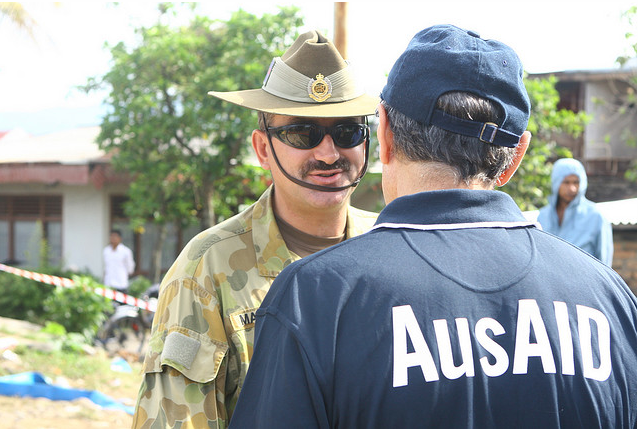
Aid Review: Weak on fragile states?
By Andrew McNee
8 July 2011
A striking statistic in the recently completed Independent Review of Aid Effectiveness is that 50% of Australia’s bilateral and regional aid is spent in so called ‘fragile states’. This is higher than any other donor in the OECD except the United States.
The DAC defines a fragile state as one with weak capacity to carry out the basic state functions of governing a population and its territory and lacks the ability or political will to develop mutually constructive and reinforcing relations within society.
Despite recognising the large concentration of Australian aid in fragile states, the Independent Review has only a limited discussion of the issue – covering it briefly in the chapter on international aid environment (p97), and again briefly as a sectoral issue under law and justice (p166). These sections recognise the importance of fragile states as a contemporary development issue, but fail to extend this discussion to engage with the literature around the specificity and complexity of aid in these contexts, and what this should mean for the Australian aid program.
There is now a growing and highly respected body of development thinking which persuasively argues that the complexity of these situations demands a different approach to aid than in more conventional situations. See for example OECD Conflict and Fragility; World Bank 2011 World Development Report – Conflict and Security; Dinnen et al on Conflict in Melanesia; William Reno on the “shadow state”; and Pritchett, Woolcock and Andrews on “capability traps” .
The Development Cooperation Directorate (CDC) of the DAC summarises:
In the world’s most challenging development situations, poorly conceived involvement can do more harm than good. Fragile and conflict-affected situations require different responses than those applied in better performing countries. These states face severe development challenges such as lack of security, weak governance, limited administrative capacity, chronic humanitarian crises, persistent social tensions, violence or the legacy of civil war.
In response to this complexity, the CDC-DAC has developed 10 principles for effective international engagement in fragile states and situations. These are:
- Take context as the starting point
- Ensure all activities do no harm
- Focus on state building as the central objective
- Prioritise prevention
- Recognise the links between political, security and development objectives
- Promote non-discrimination as a basis for inclusive and stable societies
- Align with local priorities in different ways and in different contexts
- Agree on practical co-ordination mechanisms between international actors
- Act fast… but stay engaged long enough to give success a chance
- Avoid pockets of exclusion (“aid orphans”)
A 2009 CDC-DAC survey of the international communities’ performance in implementing these principles revealed a “mixed picture”. Only 1 principle (promotion of non-discrimination) was assessed as being “good overall”. Four of the principles were assessed as “moderate and improving”, with the remainder being “mixed” (1), “moderate” (3) or “weak” (1).
Given both the importance of aid to fragile states in the Australian aid program, and the “mixed” performance of the international community in dealing with these situations, it is somewhat surprising that neither the Independent Review, nor the Government’s response, focussed particular attention on the specific issues of aid in fragile state contexts. In particular the review is silent on the critical, upfront importance of understanding the context of interventions in fragile state environments. Understanding context is Principle 1 of the effective engagement principles outlined above precisely because this understanding provides the foundation for both “doing no harm”, and in the starting on the right foot on the long, tortuous, path of supporting the growth of stable, legitimate, and grounded development institutions.
This is also a principle that internationally does not seem to be strongly adhered to. In the CDC-DAC survey mentioned above, implementation of this principle was rated as “mixed”.
A commitment to understanding context, and using that understanding in aid programming, has a number of important implications for all donors – but particularly for Australia given the degree of exposure to such situations.
Firstly, understanding context requires investment in time, expertise and country knowledge. Given, the inherently political nature of fragility such an analysis will also likely produce uncomfortable findings for both donors and governments, and as such demand a high degree of skill and sensitivity from donor staff.
Secondly, the time to undertake high quality analysis and to use that analysis in appropriate aid that meets the twin criteria of “doing no harm’ and sustainably building effective states will also impact on the timeframe within which “results” can be demonstrated. The World Bank’s 2011 World Development Report estimates it will take a generation to transform institutions.
The value of the Independent Review purposively engaging with this issue would have been to provide the policy cover for Australian aid to dedicate appropriate staff, time and resources to high quality context specific analysis, and to urge a more sophisticated and less impatient view of “results” in fragile situations.
Of course to its credit the Independent Review does suggest fragile states as a possible “flagship” area for the Australian aid program. The Government has accepted the idea of a flagship but as yet does not seem to have decided on what the flagship would be. Given the importance of aid to fragile states in the aid program, and the clear complexities and mixed international performance in its delivery, there would seem to be a clear and strategic basis for Australia to invest substantially in knowledge and practice in this area, and to demonstrate that growing capacity as a “flagship” of the aid program.
Andrew McNee is a Visiting Fellow with the Development Policy Centre at the Crawford School, ANU.
About the author/s
Andrew McNee
Andrew McNee was a Visiting Fellow at the Development Policy Centre and currently works at AusAID.
